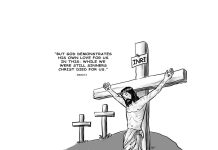BY IKE SEÑERES
WATER IMPOUNDING
Water is a commodity that is subject to the laws of supply and demand. The fact is, we have plenty of water that comes each time it rains, but these would literally “go down the drain.”
Hopefully, that problem would now end, because Dr. Antonio Mateo now has a technology for rainwater collection that is connected to water impounding. That is actually not new, because his demo unit was installed in Rizal Park years ago. This is also a solution to flooding in many areas.
TREE FARMING
In a way, trees also have a way of impounding water in their roots, aside from absorbing carbon dioxide in their trunks.
As I see it, all tree farming projects should always be tied-in to a watershed, so that we could maximize the value of these trees.
Speaking of value, we really need to create a market for forestry products, so that the value chain from “farm to food” will become complete. This is already happening in the Diocese of Cubao, where the parishioners are already buying the organic fruits and vegetables that are produced by a youth group in the Sierra Madre Mountains.
CHILDREN OF MOTHER EARTH
Mga Anak ni Inang Daigdig (MAID) is the youth group organized by Fr. Ben Beltran in what used to be the Smokey Mountain dumpsite. In between cultural presentations all over the world, members of MAID also take the time to plant organic fruits and vegetables in the mountains.
This is also a means of livelihood for them, aside from doing what is good for the environment.
OUT OF SCHOOL YOUTH
Aside from MAID, Fr. Ben also put up the Sandiwaan Learning Center (SLC) in Smokey Mountain, a facility that is accredited by the Bureau of Alternative Learning Center (BALS) under the Department of Education (DEPED).
Because of its success; Education Secretary Bro. Armin Luistro has asked Fr. Ben to make SLC the model for the implementation of BALS nationwide through Abot-Alam, a joint project of the government and the private sector to widen the reach of alternative learning.
As a way to raise funds, Fr. Ben is now looking into several waste recycling projects in cooperation with the Out-of-School Youth (OSY) who will benefit from it.
ONE MILLION YOUTH TO EDUCATE
It is no joke to educate one million OSY, and Fr. Ben is very serious about it. I was so happy when he asked me to help, because it is not only challenging, it is also rewarding in terms of psychic income.
Abot-Alam is unique in its approach, because it combines learning with working, because it also has the support of the Technical Education Skills Development Authority (TESDA). The idea is to help these young people to have an equivalent diploma (step 1), so that they could take up a vocational course (step 2). While under training, they could earn a salary through the Dual Training System (step 3) which should sustain them until they find a regular job (step 4).
VOCATIONAL INTERNSHIPS
Aside from the actual training component, the new graduates could actually go through an intensive internship program just like the way that doctors would intern in a hospital.
In the case of Fr. Ben, he is hoping that these graduates could be indirectly employed by the service providers (this could be the employment agencies) or directly by the employers.
Aside from the technical skills, he will also add values formation into the training routine.
OUTSOURCING
Provided that they would know how much their internal process costs are, it would be easy for companies to decide which of their processes could be outsourced.
Management trainer Mr. Boy Bordeos says that the trend towards outsourcing will continue, and it will eventually be accepted even by the government agencies. Under existing government rules, outsourcing appears to be the only remaining option for the agencies that either do not have the money or the authority to hire more people.
WORKER’S COOPERATIVES
It seems that modern day worker’s coops could be patterned after the artisan’s guilds during the middle ages. What is important I think is for these coops should be composed of members who are in the same trade, meaning that it should not be a multi-purpose worker’s coop.
GREEN COMMUNITIES
We should already build green communities wherever there is available space, it does not matter whether it is in the lowlands or in the highlands. If we build in the coastal areas, however, we should stay away from the danger zones, and that is for our own good.
Larry Pangan has already built a green community in the highlands of Zambales, high enough to be safe from coastal flooding in the event of ice melting due to global warming.
As part of his preparations, he is already self-sufficient in food and water, and he generates his own electricity. All he needs now is connectivity to the Internet.
BLUE ECONOMIES
Dr. Ernie Gonzales says that we should have a “blue economy” because we are surrounded by oceans and we have more sea water in our territory than land. I do not want to sound like I am exaggerating, but we are sitting on so much maritime wealth that we should tap.
If we do that, there will be no reason for anyone to be poor in this country. No one should also go hungry, because there is so much food that could be harvested from our blue oceans.
EASY COOPS
Tony Abrera now has software that would make it easy for coops to start up. His system already includes accounting and billing.
Abrera and I starting talking about this idea four years ago, but at that time, it was still too expensive to build a data center.
Because of cloud computing, the right time has come for this idea. Our shared vision is for all coops to be automated and connected, the latter for the purpose of e-commerce. (Email bantaygobyerno- subscribe@yahoogroups.com or send text +639083159262)/PN







